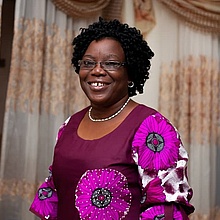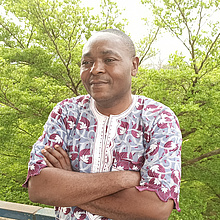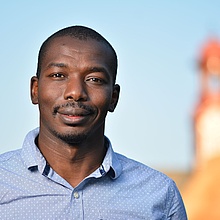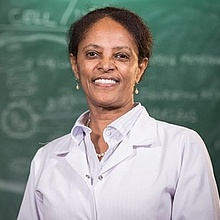

Contact
Press, Communications and Marketing
Tel.: +49 228 833-144
Fax: +49 228 833-441
presse[at]avh.de
Oluwatoyin Odeku – Harnessing natural resources
In most African countries, bananas, yams, cassava and cereal cultivars such as millet are crop plants that thrive without much assistance but frequently only serve to ensure a country’s food supply. Oluwatoyin Odeku, Professor of Pharmaceutics and Industrial Pharmacy at the University of Ibadan, Nigeria, makes every effort to raise awareness of the pharmacological potential of these native cultivars. She advocates cultivating and marketing them specifically for the local pharmaceutical industry. The biopharmacy expert has developed innovative methods for standardising the dosing of plant-based active agents and, for example, using the starch in native plants to obtain carriers for medicinal active substances in tablets and capsules. “They could replace costly pharmacological adjuvants that have to be imported”, summarised Odeku the economic potential of her research. “In this way, a cheaper and readily available raw material would be locally available to manufacturers. This would lead to cheaper medicines and economic growth for the local industry.”
Oluwatoyin Odeku promotes the Humboldt Network in Nigeria in her capacity as the Foundation’s Ambassador Scientist. For her, German-African collaboration doesn’t stand for “brain drain” but rather for a “brain exchange” that advances science in Africa, she said. This is why Odeku also advocates fostering young female researchers.

Oluwatoyin Odeku is a professor in the Department of Pharmaceutics and Industrial Pharmacy and Dean at the University of Ibadan, Nigeria. She has been a member of the Humboldt Network since her research stay as a Georg Forster Fellow at the Institute of Pharmacy at Martin Luther University of Halle-Wittenberg in 2005. Odeku’s networking initiative Academic Excellence through Innovative Mentoring won the Humboldt Alumni Award last year.
Simeon Fogue Kouam – In search of new active substances
The organic chemist Simeon Fogue Kouam also wants to make use of the resources offered by the enormous biodiversity to be found in African countries for science and for the benefit of humankind. The professor of organic molecular chemistry at the University of Yaoundé I., Cameroon, is an expert for bioactive substances that are contained in fungi. The mycologist is currently directing his attention to “coprophilous fungi”. This genus includes species of fungi that flourish on animal dung. Simeon Fogue Kouam and his team want to identify and extract those substances and compounds that have antimicrobial properties and could be put to use in the future in the fight against infectious diseases. Not only in African countries but around the world. Simeon Fogue Kouam is looking forward to the exchange that the colloquium offers. “I believe that international networking is an effective means to promote constructive exchanges of ideas among scientists and researchers. Interaction among scientists can contribute significantly to solving complex national problems and, in general, help to address global challenges that handicap development", wrote Fogue Kouam from Cameroon.

Simeon Fogue Kouam is a professor of organic molecular chemistry at the University of Yaoundé I. in Cameroon. He was a Georg Forster Fellow at Paderborn University in 2007. In 2021, he took over as director of the new Humboldt Research Hub CEnter of Competence for the study of Antimicrobial NAtural PROducts from Fungi (CECANAPROF).
Abdullahi Ahmed Yusuf – On the track of the Matabele ant
The predatory group raids of the African Matabele ant demand considerable organisational talent. Scouts are sent out to locate a promising target for their next raid. These scouts then lead columns of hundreds of ants through the savannah. Once they arrive at their destination, the group waits until all its members have arrived. Only then do the large worker ants split open the termite galleries and the smaller ants enter to kill their prey. But how does the Megaponera Analis recognise other members of its species even though it can hardly see? The South African entomologist Abdullahi Ahmed Yusuf found this out in a research project he conducted together with colleagues from Côte d’Ivoire, Germany, Switzerland, Kenya, Ruanda and Mozambique. Since the Matabele ant can be found throughout Sub-Saharan Africa, the researchers – besides conducting chemical analyses – undertook field studies in South Africa and three other African countries in order to be able to make universally valid statements about this species of ant. Their findings: This ant recognises members of its group by their scent. And they also communicate by secreting odorous substances, particularly from carbon chains, which could be detected in three populations. “Networking and collaboration in research are like the human body where each organ cannot function independent of the others. What one achieves working with others is far more than working independently", noted Abdullahi Ahmed Yusuf, who promotes the Humboldt Network in South Africa in his capacity as Ambassador Scientist of the Humboldt Foundation.

Abdullahi Ahmed Yusuf teaches at the Department of Zoology and Entomology of the University of Pretoria, South Africa. His initiative Behavioural and Ecological Principles of Biotic Interactions in Insects was chosen to receive the Humboldt Alumni Award in 2019. He became a member of the Humboldt Network as a Georg Forster Fellow in 2015.
Yalemtsehay Mekonnen – Recommendations for sharing scientific findings
The Ethiopian zoologist Yalemtsehay Mekonnen is ready and waiting with recommendations for the post-Covid-19 era. Thanks to modern communications technologies, it has been possible for researchers to continue sharing information and ideas even during the Covid-19 pandemic. “We should set up a database of African researchers from all disciplines so that we know who is conducting research and what they are conducting research on. This would be a very easy and practical way to organise collaboration“, suggests Mekonnen. During her singular career, she has always advocated and supported networking between African researchers in general and female researchers in particular. Mekonnen was the first woman to receive a professorship in Ethiopia. The advancement of women is personally very important to her: “In Ethiopia and other African nations, the advancement of women is not just something related to ideal values such as diversity, gender equality and personal autonomy. Participation in higher education is quite simply a social imperative. We need well-trained women in qualified occupations in order to advance the technological and social development of our country. Women are our future!” explained Mekonnen last year in the Humboldt Kosmos.

Yalemtsehay Mekonnen is a professor of cell and human physiology at the College of Natural Sciences of Addis Ababa University, Ethiopia. A Georg Forster Research Fellow at Martin Luther University of Halle-Wittenberg from 2001 to 2002, she received the Humboldt Alumni Award in 2018 for her project Creating a Network of Female Academics and Researchers in Ethiopia.
